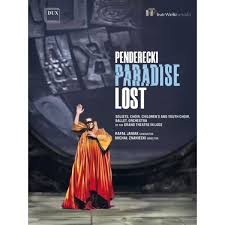PENDERECKI Paradise Lost (Janiak)
View record and artist detailsRecord and Artist Details
Genre:
Opera
Label: Dux Recordings
Magazine Review Date: 10/2024
Media Format: Digital Versatile Disc
Media Runtime: 179
Mastering:
DDD
Catalogue Number: DUX8056

Tracks:
| Composition | Artist Credit |
|---|---|
| Paradise Lost |
Krzysztof Penderecki, Composer
Agnieszka Makówka, Sin, Mezzo soprano Aleksandra Borkiewicz-Cłapińska, Zephon, Soprano Alexander Kunach, Michael, Tenor Andrzej Pieczyński, Milton; Voice of God, Speaker Bartłomiej Misiuda, Satan, Baritone Bernardetta Grabias, Ithuriel, Mezzo soprano Chorus of the Grand Theatre in Łódź Emil Ławecki, Belzebub, Tenor Jan Jakub Monowid, Death, Countertenor Joanna Freszel, Eve, Soprano Łukasz Motkowicz, Mammon, Baritone Mariusz Godlewski, Adam, Baritone Michał Sławecki, Raphael, Countertenor Orchestra of the Grand Theatre in Łódź Paweł Skałuba, Gabriel, Tenor Rafał Janiak, Conductor Rafał Pikała, Moloch, Bass Volodymyr Pankiv, Christ, Bass Zbigniew Malak, Belial, Tenor |
Author: Christian Hoskins
Penderecki’s Paradise Lost, based on the epic poem by Milton, was commissioned by the Lyric Opera of Chicago for the United States Bicentennial in 1976 and received its first performance in November 1978. The libretto was written by Christopher Fry, who selected approximately 1500 of the original 10,000 lines in the poem for his text, focusing the narrative on Adam and Eve rather than Satan, although the latter is also represented, as are a quartet of his minions, a quintet of angels, God, Christ, Sin, Death, and Milton as a narrator.
Penderecki subtitled the work ‘Sacra rappresentazione in two acts’, suggesting an approach part way between oratorio and opera. The score follows traditional operatic conventions rather than being through-composed, with solo scenes, duets and larger ensembles. The choir also contributes to the development of the narrative. Stylistically, however, the writing is expressionistic and angular, closer to the modernism of Penderecki’s 1960s works than the neo-Romantic scores that define his later style. There are quotations from Wagner’s Lohengrin in Act 1 and Bach’s St John Passion in Act 2, and the work concludes with a resounding D major chord, but the overall impression is one of darkness and intensity. Despite many impressive passages, especially at the very start, the static nature of the conception and lack of musical development make strong demands on the audience’s stamina, no doubt accounting for the work’s limited take-up in subsequent years.
The DVD from the Grand Theatre in Łódź – the work’s first official release in any format – preserves a production that’s often striking in terms of set design, costume and projected imagery, although the darkness of the staging results in large areas of black on the screen for much of the running time. There’s no lack of movement of the cast around the stage, and Adam and Eve are portrayed by two dancers as well as two vocalists, as in the original production. Sławomir Kalwinek’s video direction brings a well-chosen mix of closeups and distance shots.
The roles of Milton and God are sonorously voiced by actor Andrzej Pieczyński in Polish, while the rest of the cast sing in English. The performances are for the most part very good, especially Joanna Freszel as Eve and Bartłomiej Misiuda as Satan. Unfortunately, the English language diction of several of the singers, including Mariusz Godlewski (Adam) and Emil Ławecki (Belzebub) is often poor, necessitating the use of subtitles to understand some of their lines. (The subtitles themselves are also subject to a number of typographic errors.) Nevertheless, both the singing and orchestral playing are consistently communicative under conductor Rafał Janiak during what would have been a long evening in the theatre, comparing favourably with the unofficial recording of the first performance posted on YouTube. This is a very welcome release and will do much to increase the understanding and appreciation of one of the composer’s most significant works.
Discover the world's largest classical music catalogue with Presto Music.

Gramophone Digital Club
- Digital Edition
- Digital Archive
- Reviews Database
- Full website access
From £8.75 / month
Subscribe
Gramophone Full Club
- Print Edition
- Digital Edition
- Digital Archive
- Reviews Database
- Full website access
From £11.00 / month
Subscribe
If you are a library, university or other organisation that would be interested in an institutional subscription to Gramophone please click here for further information.




